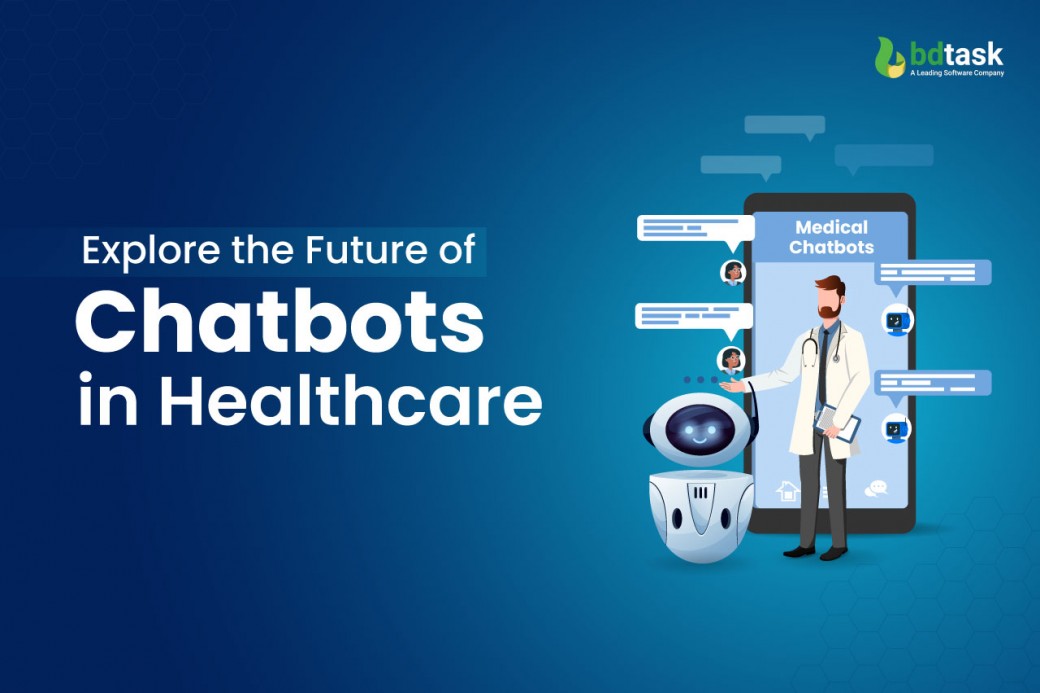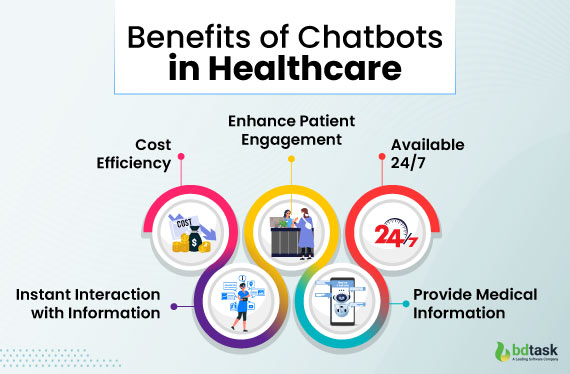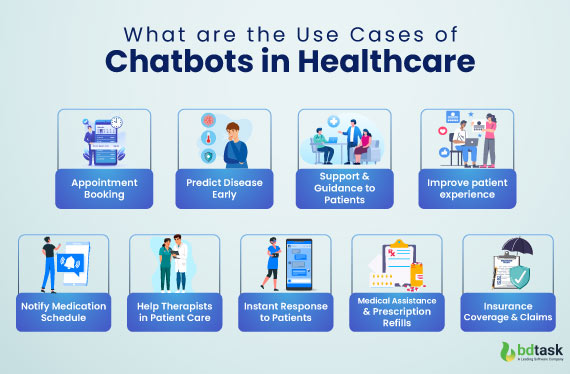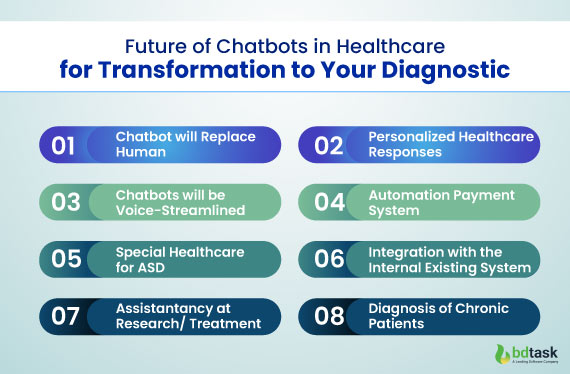Explore the Future of Chatbots in Healthcare & Its Best Use

Do you think about implementing chatbots in your healthcare? Or are you beyond thinking about the future of chatbots in healthcare? If so, this article is for you.
Chatbot technology is working to enhance the efficiency of healthcare industries. It will be the most crucial factor in the healthcare sector and go beyond our imaginations for their advancements.
Chatbots have become an integral part of the healthcare industry. Their widespread adoption, ability, and efficiency in modern business help meet and satisfy customers' expectations.
Healthcare chatbots use AI, ML, and NLP to understand patients' needs and provide accurate results. Besides, the users get an easier process for diagnosis through chatbots.
In this article, I will illustrate the future of chatbots in healthcare. This blog will help you get a glimpse of chatbot use cases and benefits in healthcare. Let's go through this.
Benefits of Chatbots in Healthcare

Medical chatbots have several benefits in the healthcare industry. Some we can visibly understand, and some we don't. However, healthcare chatbots are important for their significant benefits and regard.
That's why healthcare tools have significantly increased in recent years. Let's begin with the top advantages of chatbot technology in healthcare:
# Available 24/7
Chatbots don’t go for breaks or any sleep. They are available 24/7 for support. The healthcare industry can benefit by implementing chatbots and providing their users with an efficient service. Chatbot welcomes users well and answers their queries for the whole day. Integrating services like Calmerry can enhance patient interactions further by providing consistent mental health support.
# Enhance Patient Engagement
A healthcare chatbot can easily handle patients’ queries and answer them. It can provide accurate information and make recommendations. Patients can ask any questions and get personalised experiences.
Moreover, a customer service officer can’t handle ten individual users where a chatbot can equally respond.
# Instant Interaction with Information
Chatbot can instantly provide answers to the users at any time. Generally, a customer caregiver can’t handle multiple clients simultaneously. In the future, no patient will miss interactions with chatbots in healthcare. A chatbot can spontaneously interact with the users with accurate delivery.
For example, if a patient has a cardiac attack, he can not be moved. Now, what does the patient’s attendant do? They can use the chatbot of any healthcare provider and ask them for instant healthcare with necessary remedies.
# Provide Medical Information
One significant benefit of chatbots is that they provide constant and reliable advice, procedures, and information about healthcare. They also provide up-to-date news and information about disease symptoms, appointments, medications, and admission procedures.
These services are essential for any patient. Consequently, users will convince and easily trust them and make decisions, saving time.
# Cost Efficiency
Implementing a chatbot is more cost-effective than hiring customer care agents. Also, it helps to reduce the costs of healthcare services by its features.
Chatbots have automated routine tasks, such as administrative tasks, medication reminders, appointment scheduling, and medical information providers, which can significantly reduce healthcare’s gross costs.
What are the Use Cases of Chatbots in Healthcare

Chatbots are mainly used to provide medical help in the healthcare industry. The use of chatbots in healthcare is very essential for transforming this industry.
Chatbot use cases in healthcare are appointment booking, symptom assessments, improved patient experiences, and medical assistance with instant responses. Let's discuss these use cases below:
-
Appointment Booking
Hospital appointment chatbots can be immensely beneficial for healthcare centres. Any user from anywhere can use a chatbot to book a doctor's appointment. Users can get information about doctors' names, specialities, free slots, booked slots, and OT time to book appointments.
Chatbots make this appointment journey a hassle-free and stress-free process. Moreover, appointments can be assigned to doctors' calendars by sending emails to create a slot and notify patients. In the future of chatbots in healthcare, patients will prefer an easier way to book appointments.
-
Symptoms Assessment & Predict Disease Early
Patients can assess their symptoms through the medical AI chatbots in healthcare. Chatbots are trained to analyse symptoms based on disease-specific parameters. They can help patients to determine their diseases and suggest diagnosis guidelines and remedies.
Besides, patients don't need to re-enter their information as the chatbot notes their patient details. So, patients can easily check their data and symptoms, measure their severity, and receive personalised recommendations from the chatbot.
-
Support & Guidance to Patients
A conversational AI chatbot can answer patients' questions, give directions, and provide therapeutic solutions. The best example of chatbots in healthcare is the Woebot. It is a prescriptive chatbot that Stanford University assigns.
Woebot provides mental health care using cognitive behavioural therapy (CPT) techniques. Patients who have anxiety disorders, depression, or mood disorders can converse with this chatbot. This bot helps patients understand their thoughts and makes their behaviour reshape and normal.
-
Improve patient experience
Patient engagement is a crucial part of any health organisation. Health providers engage patients through chatbots by offering medical conditions, treatment plans, efficient treatment policies, etc.
In addition, they offer appointment reminders, medication instructions, symptom assessments, less administrative work, and many others.
Chatbots can even provide primary care to non-critical patients, easing patients' and healthcare providers' pain. In this way, chatbots in healthcare engage patients and improve their experience.
-
Notify Medication Schedule to the Patients
There are various types of patients in healthcare. For example, patients can be old or young or native language speakers from other countries who have hearing or vision problems. Chatbots can provide medication reminder services for these people if they need them.
If they forget to take medication or doctor's appointments, the chatbot can help them in this case. Chatbot reminds them of the medication as if they don't miss the medication dose or visit the doctor.
-
Help Therapists in Patient Care
Therapy chatbots are the best tool for helping Therapists treat mental issues in patients. Intelligent software programs of chatbots help people with mental health conditions overcome these issues more effectively.
Now, what are the advantages of chatbots for mental health? Medical AI chatbots can collect enough patient data in time to provide day-to-day therapy requirements. Moreover, these bots understand the patient's situation and behaviour. Then, they help users by providing proper assistance through technology.
-
Instant Response to Patients
The best part of chatbots is that they can effectively handle FAQs. Chatbots in healthcare can answer users' common questions easily.
Furthermore, patients can use chatbots to contact consultants. Hence, a healthcare conversational chatbot provides an excellent all-in-one solution for users. Some of the best healthcare chatbots are Innue, Healthtap, Ada Health, Babylon Health, and many more.
-
Medical Assistance & Prescription Refills
Healthcare chatbots can collect and save patients' details. Thus, patients can leave information without dealing with medical staff for follow-up requests. Chatbots can even provide telemedicine support to patients.
Moreover, if the patient requests the required drugs, a chatbot can get the doctor's approval and refill the prescribed medicine. Then, the healthcare chatbot will notify the patient if the packing is ready.
-
Insurance Coverage & Claims
Health insurance chatbots can help file and track claims, existing coverages, and medical bills. So, there is no need to record and track claims. Sometimes, this tool also helps doctors by checking the pre-authorization process and billing queries.
Future of Chatbots in Healthcare for Transformation to Your Diagnostic

Medical chatbots are improving the experiences of patients and providers. They are also helping healthcare by reducing staff workload and gross costs and enhancing patient care with 24/7 services.
Now, 38% of healthcare providers use various software and tools as part of their treatment. The number of users will increase in the future. Let’s look into the future of chatbots in healthcare.
1. Chatbot will Replace Human
A chatbot is more active rather than a human agent as chatbots don’t take a rest or break. So, in the future, organisations are more likely to replace chatbots in human positions. With the chatbot, users will experience more natural interaction.
Moreover, NLP and ML chatbots will soon closely mimic human interaction. Conversational AI chatbots use NLU (Natural Language Understanding), NLP (Natural Language Processing), and ML (Machine Learning) to understand human language, behaviour, and intention.
2. Personalized Healthcare Responses
AI-powered chatbots enable customization in healthcare, where huge amounts of medical data can be input. Furthermore, additional data is created through wearable technology, including smart jackets, sensorized insoles, wristbands, and more.
Wearable users can thus get useful information about their blood pressure, heart rates, body IMR, and calories burned. Users get personalised diet and exercise plans when all this data is inserted into an AI-enabled chatbot.
3. Chatbots will be Voice-Streamlined
Chatbots with voice capabilities will be comprehensive in the future because the popularity of voice assistants is rising tremendously. Developing chatbots in healthcare can streamline routine tasks and offer initiative support in the future.
Users will intend to converse with a chatbot using voice commands. Voice-based AI assistants will improve customer experiences by generating accurate answers.
4. Automation Payment System
Healthcare providers use chatbots to enhance patients’ experiences. Though this task is basic, the essential and potential utility will be applied as a diagnostic tool.
In addition, chatbots help reduce staff load and overhead costs, improve patient services, and are available 24/7. They have more capabilities like dealing with claims, insurance companies, and automated medical bills.
5. Special Healthcare for ASD & Mental Health Issues
AI-powered chatbots effectively humanise the experience for people with a mental health condition and ASD (Autism Spectrum Disorder) patients. Users feel like they are interacting with a real human. Understanding mental patients’ behaviour, feelings, and anxieties undoubtedly helps to improve their mental health.
For example, patients can use a conversational AI chatbot for healthcare to discuss their feelings. A doctor can interact with patients through a chatbot if they need to go beyond.
6. Integration with the Internal Existing System
Healthcare institutions use various IT software and hardware solutions for different purposes. They use these solutions for managing different departments and numerous vendors worldwide.
Therefore, simultaneous integration of chatbots with hardware and multiple IT software can be difficult and more time-consuming. Besides, data-sharing procedures and harmony issues still need to be standard positions in healthcare. But in the future, these problems and challenges will be solved by the collaboration of AI chatbots and healthcare providers.
7. Assistantancy at Research/ Treatment
Harnessing technology, especially machine learning, to analyse data and information is crucial for research and studies. A doctor can’t remember each research result that a machine can deliver faster. AI chatbots can store and deliver all the data for doctors and patients when needed.
8. Diagnosis of Chronic Patients
In the future of healthcare, chatbots with artificial intelligence will diagnose chronic diseases and accurately treat them. They can analyse patients’ crucial data insights and make decisions.
For example, AI-powered whole-heart computational chatbots provide personalised treatment to comprehend the numerous ventricular arrhythmias well.
How to make a healthcare chatbot?
Though AI powers all chatbots, modern chatbots use conversational AI techniques like NLU (Natural Language Understanding), NLP (natural language processing), and ML (Machine Learning).
Exploring the future of Chatbots in healthcare, now decide the right model that defines and fulfils your goals. Most companies want a mix of rule-based and AI-powered chatbot flows for their healthcare. You have to focus on some issues when choosing to build your chatbot. Let's follow some steps to build your chatbot:
Step 1: Define your Purposes
The first step in creating a healthcare chatbot is clearly defining your goals. This concept should be based on your and your users' needs.
Step 2: Choose a Chatbot Platform
Select the appropriate platform based on your purposes and goals. In this case, you need to know or experiment with what will be best for you. However, use the most popular chatbot platforms, Dialogflow, TARS, Botsify, etc.
Generally, the Naive Bayes Algorithm is used to build a healthcare bot, which is a web application. This bot uses AI and ML to answer patients' questions and inquiries.
Step 3: Select the Right Technology Stack for the chatbot
You have to choose your technology stack carefully. Technological stack is an important factor that helps to target your audience. Multiple options are available to develop your chatbots, such as Android and the IOS app. Select what you want to target, or you can choose both.
Step 4: Designing and Customization the Conversation Flow
Design the conversational flow based on your utilisation. This crucial phase includes wireframing, frontend development, API integration, backend development, etc.
You can check out the Innue for website chatbot, which can be customised to make healthcare chatbot according to your needs. If you need help understanding, click to see the free demo or consult experts.
Step 5: Test & Deploy your Chatbot
After developing your chatbot, the QA and Testing teams will ensure it is ready for streaming.
They will inform you and the developer team for correction if any unwanted symptoms happen. If all is okay, then the app is ready to launch to the users.
Step 6: Collect & Observe Data and Optimise
Always choose a platform that provides a clear way of data observation and optimization analysis. For example, if a patient drops off the conversation, optimise why he dropped off that particular part and try to fix it. You can fix it yourself, or if you need help, consult the developer team to fix the issues.
However, you may build it yourself or can contact the chatbot platform. Now you have raised chatbot-related questions & answers; for instance, how much does it cost to make a healthcare chatbot? You can analyse chatbot building prices here to get a better idea.
Summing Up
Though healthcare chatbots are still new in the healthcare industry, the future of chatbots in healthcare will be cherished and successful. Chatbots will enhance the shape of the future of healthcare industries.
However, the chatbot will soon be able to provide real-time health status and monitor aid requests during shortages. Furthermore, it will provide enhanced assistance in managing mental health, chronic illnesses, wellness issues, psychological disorders, etc.
Moreover, medical chatbots will likely start proactively identifying disease symptoms, cross-referencing patients, and analysing medical history and previous case scenarios. They empower healthcare providers to deliver personalised services to their clients efficiently.











